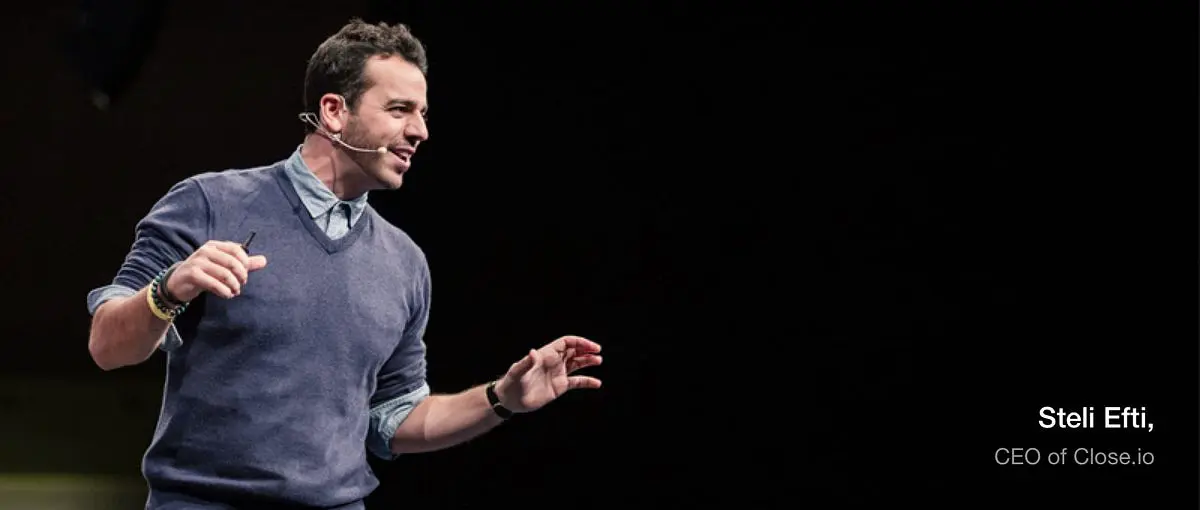Steli Efti has been an entrepreneur since the age of 17. He grew up in Germany and, one sunny day, decided to buy a one-way ticket to San Francisco to build a startup in Silicon Valley. And, that’s exactly what he did! Steli is now CEO and co-founder of Close.io, a 7-figure SaaS CRM that helps companies boost their sales. At the same time, he’s became a ‘Sales Master’ who writes books, publishes blog posts, gives lectures and runs courses on the subject.

Here’re his answers to our questions.
How did you end up building a SaaS company?
With my current partners at Close.io, we first launched a “sales-as-a-service” business called Elastic Sales. Most of our customers were SaaS companies and, in order to run simultaneous sales campaigns, we had to use a backbone CRM. But we were so disappointed with the softwares available on the market that we ended up developing our own.
Little by little, we realized that the software we were building had enormous potential and decided to launch it as a separate product in 2013. And, so Close.io was born! By 2014, the software was bigger than our services company, so we decided to shut down Elastic Sales to focus on building up our new venture.
You can read all about it in the letter I published on Elastic sales website.
And, that’s pretty much how I “fell” into SaaS.
What surprises did the SaaS model throw at you?
For me, the most surprising thing about SaaS is that results you get today are mostly based on what you did a few months ago. There’s a big delay between your actions and the real return. For instance, if you mess something up, the outcome is not as immediate as in other businesses. On the other hand, when you do something really well, you don’t know how good it will be straight away.
This is very challenging, especially as your team grows.
For you, what makes a successful SaaS entrepreneur?
What makes someone successful as an entrepreneur is the confidence (or delusion!) that you can create something people want and the ability to learn and change as necessary until you’ve finally succeeded with it. SaaS entrepreneur often have to invest 5–7 years of their time until their business hits massive scale so they have to be more patient and have a longer term perspective than most end consumer entrepreneurs today.
How did you convert your first customer?
One of the first companies that signed up was a “unicorn-style” company. We were, obviously, very excited. However, towards the end of the sales cycle, they started making very harsh — although not surprising — demands such as “we need these features in 3 weeks”. But, we had enough experience in sales and the features they were asking for weren’t our top priorities. Although we were very tempted to say yes, we didn’t cave in. We thought that they’d look elsewhere, but they came back… asking for a massive 70% discount on the subscription.
If it had been our first time running a business, we’d probably have given everything they wanted, but our experience gave us the courage to say “no” again. Of course, a very well-known company logo on our website is valuable, but this kind of discount doesn’t fit into our philosophy and would be unfair to other customers.
We didn’t hear anything for a few days, but then, suddenly, we saw that their credit card payment had come through!
The moral of the story?
- Firstly, when your product has real value, don’t be afraid to say no to massive discounts and don’t change your feature roadmap for just one client.
- Secondly, when customers ask for a feature would make them buy your product, it might be true but it might also be just about negotiation.
SaaS is often seen as unsexy. What do you reply to that?
In the Valley, SaaS has definitely become sexier in recent years.
I think SaaS isn’t as appealing as B2C because in B2C, there’s a chance — although tiny — of becoming a billion dollar company in a few months. In SaaS, it’s not impossible, but it’s a lot less likely.
However, for me, in B2C, there are a lot more unknowns. In SaaS, if you know the “ABC of entrepreneurship” and have an efficient solution that solves big problems, you can build a billion dollar business. It may take a while and you’ll have to work a lot, but I think there’s a higher chance of success than in any other field.
What would be your #1 advice for entrepreneurs launching a SaaS company?
Without hesitation, spend a lot of time on working out who your ideal customers are. In the early days, you want to reach 10 customers as fast as possible to make sure there’s enough interest in your product. Once you get there, slow down and check which of these 10 are the most valuable. You have to grow step by step, customer by customer, instead of reaching 100 customers at breakneck speed.
If you don’t give yourself time to think, you’ll start seeing churn and you’ll waste money convincing customers who will never evangelize about your product. It’s better to have 10 customers who are crazy about your product than 100 who are moderately satisfied.
So, while in beta, visit every customer. Literally. Drive to their office, watch them using your software in their environment and talk with them. There are no better insights than when you meet your customer face-to-face.
Follow Steli on Twitter and subscribe to Close.io’s blog, they publish awesome content on B2B SaaS.
